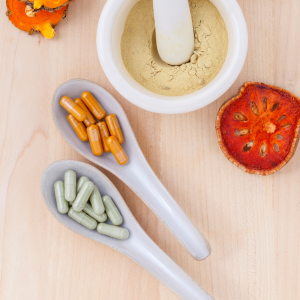
It can happen to just about any woman at any time...
- A 20-something career woman busting her butt on the job and seeing her period problems escalate the higher her stress levels rise.
- A new mom who’s just freakin’ tired and feels like she never quite got back to her old self after baby.
- A chronic worrier coping with the early effects of perimenopause in her late 30s despite a pretty regular period—everything seems fine with her flow, but she can feel herself aging way too fast and way too soon.
- A long-time birth control user who’s now noticing some major side effects after quitting the pill.
What do all these ladies have in common? A zero-mile-per-hour sex drive that’s left them feeling flat, frustrated, and completely out of touch with their femininity.Maybe you recognize yourself in one of these women, or you have a friend, family member, or romantic partner struggling to feel sexy. No matter which one of these scenarios you connect to, the bottom line is that they’re all rooted in reality and a missing libido isn’t just a figment of the imagination—it’s a concrete phenomenon that’s unfortunately an all-too-common consequence of endocrine dysfunction.
Why are so many women dealing with low sex drive?
There are so many overlooked factors that can contribute to hormonal chaos and low sex drive, but few medical experts will ever dare broach the topic. And it’s important to spell out what we mean when we’re talking about “low sex drive”: you could either be dealing with a lack of desire for sex or a lack of sexual responsiveness (i.e. mind-blowing orgasms—or any orgasms at all). Both scenarios are a problem, and both qualify as low libido.
Here are a few reasons your sex drive might be stalled:
- You’re beyond stressed. Don’t discount the profound physical effects psychological factors can have, especially on your libido. Everything from stress, anxiety, and depression to poor body image, low self-esteem, and history of abuse can significantly impact your sex drive.
- You’ve been on birth control for any length of time. A study published in The Journal of Sexual Medicine revealed that women who have taken the birth control pill may find that, as well as having had low sex drive when on the pill, that this side effect persists even when they stop taking it. The researchers discovered that the impact the birth control pill has on women’s testosterone levels can cause them to have a permanently suppressed sex drive when compared to women who have never used the birth control pill.
- You’re over 35. Perimenopause has a profound effect on your entire endocrine system, and can spin your sex drive out of whack. Before 35, your desire is driven primarily by the biological impetus to reproduce and your libido peaks around ovulation each month. After 35, as your hormone levels start to shift, your body just isn’t not as strongly driven by that natural instinct and it will require external direction in the form of nutritional and physical cues.
- You have an endocrine issue like PCOS. Women with PCOS typically either experience low libido as a result of low testosterone levels and high sex hormone binding globulin levels (SHBG) or a high libido (along with acne and hair loss/unwanted hair growth). Either imbalance of masculine and femininity can create a disconnect between your emotions and your libido, making sex a struggle, even if the desire is there.
The 5 Supplements You Need to Support Your Sex Drive
When it comes to healing hormonal dysfunction, food is always your best ally. But let’s be real: if your libido is lagging, you’re already tired, stressed, and dealing with one too many things on your plate. Fixing your eating habits will be crucial, but at this moment, you’re in crisis mode. You need tools that will fast track your healing so you feel motivated and empowered to keep making the right self-care choices. The easiest way to do that? Supplements. Here are the five you’ve gotta have on hand in order to kickstart the sexual healing:
1. B Vitamins support your adrenal glands by preventing the breakdown of too much dopamine and serotonin during stressful times, leaving enough for us to remain buoyant and energized.
2. Zinc helps to boost your testosterone production and prevents testosterone being turned into estrogen by blocking the enzyme responsible.
3. Omega-3 fatty acids help balance out your progesterone and estrogen levels, which in turn will increase dopamine, which will, in turn, help you produce more nitric oxide. This is absolutely essential for the dilation of blood vessels and tumescence that leads to bigger and better orgasms.
4. Magnesium makes it harder for your testosterone to bind onto proteins and allows for more of it to remain “free” in your bloodstream – which is exactly how you want it to be for a higher sex drive. Higher levels of free testosterone makes for more desire. Magnesium also combats anxiety and prevents depressive feelings, helping you enjoy yourself more.
5. Probiotics may not directly affect your sex hormones, but they do impact your mental health, which—as you already know—directly affects your sex drive. Studies have linked psychiatric disorders like depression to imbalanced gut bacteria and probiotics have the power to restore microbiome balance.
Love and ovaries,
Alisa





